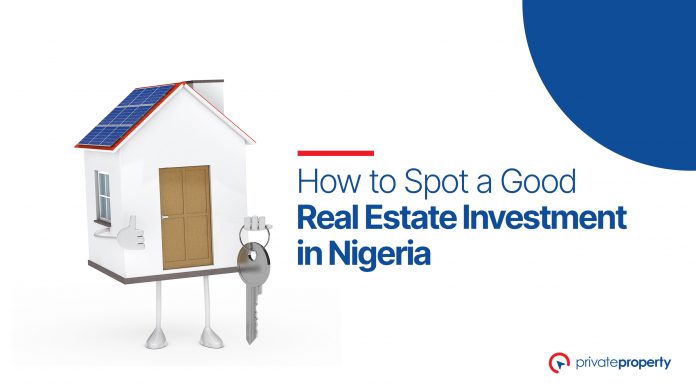Investing in real estate is one of the most reliable ways to build wealth, but not every property is a good investment. Nigeria’s real estate market is dynamic, with opportunities in residential, commercial, and industrial sectors.
However, investors must conduct thorough research and due diligence to ensure profitability. Here are key factors to consider when identifying a good real estate investment in Nigeria.
1. Location
The location of a property is the most crucial factor in determining its value and potential return on investment (ROI). When scouting for a good real estate investment in Nigeria, consider:
Urban vs. Rural: Properties in urban areas like Lagos, Abuja, and Port Harcourt typically yield higher returns than rural locations.
Proximity to Infrastructure: Access to good roads, electricity, water supply, and public transport enhances a property’s value.
Economic Hubs: Locations near commercial centers, business districts, or industrial zones tend to appreciate faster.
Security: Gated estates, well-policed neighborhoods, and areas with low crime rates are more attractive to buyers and tenants.
2. Market Demand and Trends
Understanding market trends is essential for making an informed investment. Research the following:
Rental Demand: Are there high occupancy rates in the area? Locations with a strong rental market guarantee steady income.
Property Appreciation Rates: Investigate past price trends to predict future growth potential.
Emerging Developments: Government projects like new roads, bridges, or commercial districts can drive up property value.
Target Audience: Know whether you are catering to young professionals, families, or expatriates.
3. Legal and Documentation Verification
Many investors fall victim to fraudulent transactions due to improper legal verification. To avoid pitfalls:
Confirm Title Documents: Ensure the property has valid documents such as a Certificate of Occupancy (C of O), Governor’s Consent, or Deed of Assignment.
Conduct Land Search: Visit the land registry to confirm ownership and check for legal disputes.
Avoid Omo-Onile Issues: In Lagos and other states, land disputes with local landowners (Omo-Onile) can be problematic. Work with a trusted real estate lawyer to avoid these issues.
4. Financial Feasibility and Return on Investment (ROI)
Before purchasing, evaluate the financial prospects of the investment:
Cost vs. Value: Does the price align with the property’s potential ROI?
Rental Yield Calculation: Compare the expected annual rental income against the purchase price to determine profitability.
Property Appreciation: Consider how much the property’s value is expected to rise over time.
Maintenance Costs: Factor in the cost of repairs and renovations, especially for older properties.
5. Developer Reputation and Quality of Construction
If you are buying from a real estate developer, research their track record. A reputable developer ensures quality construction and timely project completion. Look out for:
Previous Projects: Visit completed properties to assess their quality.
Reviews and Testimonials: Check online reviews and client feedback.
Building Materials: Poor construction quality leads to higher maintenance costs in the long run.
Project Timelines: Delays in off-plan projects can affect investment plans.
6. Accessibility and Transportation
The ease of access to a property significantly impacts its desirability and value. Consider:
Proximity to Major Roads: Properties near expressways, bridges, and highways are in high demand.
Public Transportation Availability: Locations with easy access to buses, trains, or water transport attract more tenants.
Traffic Congestion: High traffic areas can reduce the appeal of certain locations.
7. Purpose of Investment
Your reason for investing should align with the type of property you choose. Are you buying for:
Rental Income? Choose properties in high-demand rental areas.
Resale? Look for properties with strong appreciation potential.
Commercial Use? Consider properties in business hubs like Victoria Island, Ikoyi, or Abuja’s Central Business District.
Land Banking? Buying land in developing areas for future resale is a profitable long-term strategy.
8. Government Policies and Regulations
Government policies can influence property values. Stay informed about:
Land Use Act: Understand how land ownership works in Nigeria.
Real Estate Taxes: Be aware of property taxes and levies.
New Regulations: Changes in zoning laws, property registration, and urban development policies can impact investments.
9. Hidden Costs and Additional Expenses
Beyond the purchase price, consider:
Agency and Legal Fees: Typically 5-10% of the property cost.
Survey and Documentation Fees: Costs vary by location.
Service Charges: Common in estates and gated communities.
Renovation and Repairs: If buying an old property, budget for necessary upgrades.
10. Work with Real Estate Professionals
To minimize risks, work with:
Reputable Real Estate Agents: They provide valuable market insights.
Property Lawyers: They ensure legal verification and proper documentation.
Surveyors and Valuers: They help assess property conditions and fair market value.
Financial Advisors: They assist in structuring your investment plan.
Conclusion
A good real estate investment in Nigeria requires careful analysis of location, market demand, legal status, financial viability, and government regulations. Avoid rushed decisions and conduct thorough due diligence. By following these guidelines, investors can maximize profits and minimize risks, ensuring a successful venture into Nigeria’s booming real estate sector.
Frequently Asked Questions (FAQs)
1. What are the safest cities in Nigeria to invest in real estate?
The safest cities for real estate investment in Nigeria include Lagos, Abuja, and Port Harcourt. These cities have strong economic activities, high rental demand, and better infrastructure.
2. How do I verify if a property has a valid title document?
You can verify a property’s title at the state land registry. It is advisable to work with a real estate lawyer to conduct a thorough title search.
3. What is the minimum amount needed to start investing in real estate in Nigeria?
The cost varies based on location and property type. In cities like Lagos and Abuja, you may need at least ₦5 million to ₦10 million for a small property. However, land in developing areas can be more affordable.
4. Is buying land a better investment than buying a house?
Both have their advantages. Land banking offers long-term appreciation, while houses provide immediate rental income. The best choice depends on your investment goals.
5. What should I consider before buying off-plan properties?
Check the developer’s reputation, verify legal documentation, ensure a clear payment plan, and assess the project’s expected completion timeline to avoid delays or scams.









